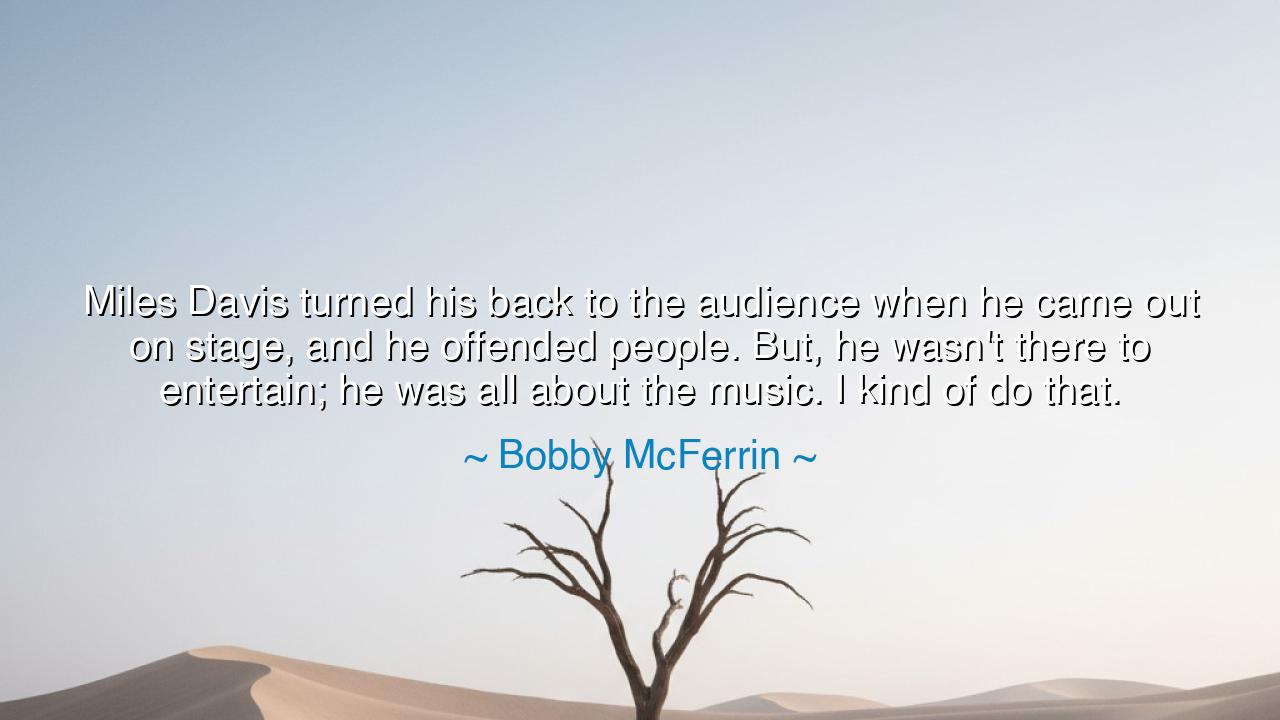
Miles Davis turned his back to the audience when he came out on
Miles Davis turned his back to the audience when he came out on stage, and he offended people. But, he wasn't there to entertain; he was all about the music. I kind of do that.






Hear the words of Bobby McFerrin, a master of voice and spirit, who declared: “Miles Davis turned his back to the audience when he came out on stage, and he offended people. But, he wasn’t there to entertain; he was all about the music. I kind of do that.” In this teaching lies a truth as sharp as a blade and as deep as a well: that the artist is not a servant of applause, but a vessel of creation. He exists not to flatter the ear of the crowd, but to give himself wholly to the work, even if the crowd does not understand.
When Miles Davis turned his back to the audience, many thought it arrogance. Yet it was not disdain, but devotion. He refused to play for approval; he played for truth. The notes, the rhythms, the silences—these were his world. The crowd was not master, nor judge, nor god. The music itself was the altar, and Davis bowed only to it. In his gesture, though small, was the defiance of a prophet: that art must remain pure, unswayed by the fickleness of public desire.
McFerrin, in invoking this act, confesses his own kinship with that philosophy. He too declares that he is not merely there to entertain. He does not step upon the stage only to please, but to reveal, to explore, to let music live through him. For to seek only the smile of the audience is to chain the artist; but to seek the truth of the art is to set both artist and listener free. The crowd may not always understand, yet in the end they receive something greater than simple pleasure—they receive honesty.
History gives us another mirror in the figure of Vincent van Gogh. He painted not for patrons, not for crowds, but for the truth within his vision. In his time, he offended many with his rough strokes and violent colors. He sold but a handful of paintings. Yet he was not there to entertain the tastes of his age. He was all about the art itself. And though the world rejected him then, his works now resound as some of the greatest ever made. Like Davis, like McFerrin, Van Gogh bore the mark of one who bows only to truth.
This path is not easy. To turn away from the audience is to risk misunderstanding, scorn, even failure. The artist may stand alone, rejected by the very people he longs to touch. Yet here lies the paradox: only by refusing to serve the applause can the artist create something eternal. If Davis had played only to please, his music might have been forgotten. By daring to offend, he carved sounds that reshaped the very language of jazz. By daring to follow only the music, he became immortal.
The lesson, O seekers of wisdom, is fierce and clear: do not shape your work only to please the crowd. Whether you are an artist, a thinker, a builder, or a leader, do not bow to the shifting winds of approval. Serve the truth of your calling. Commit yourself wholly to the work itself. If it offends, let it offend; if it confuses, let it confuse. Better to be faithful to your art than to betray it for fleeting applause. For applause fades, but truth resounds forever.
So, O children of tomorrow, take McFerrin’s and Davis’ teaching into your hearts. When you stand before others, do not live for their gaze alone. Turn, if you must, not your back in contempt, but your face toward the work that matters most. Let your devotion to music, to truth, to creation, guide you. And when the crowd sees your sincerity, even if they do not understand at first, they will in time know: you were not there to entertain, you were there to reveal the eternal. And that is the higher calling.






AAdministratorAdministrator
Welcome, honored guests. Please leave a comment, we will respond soon